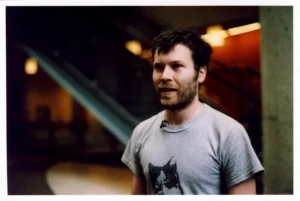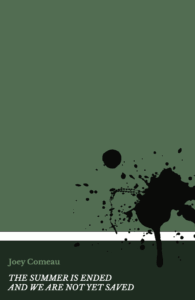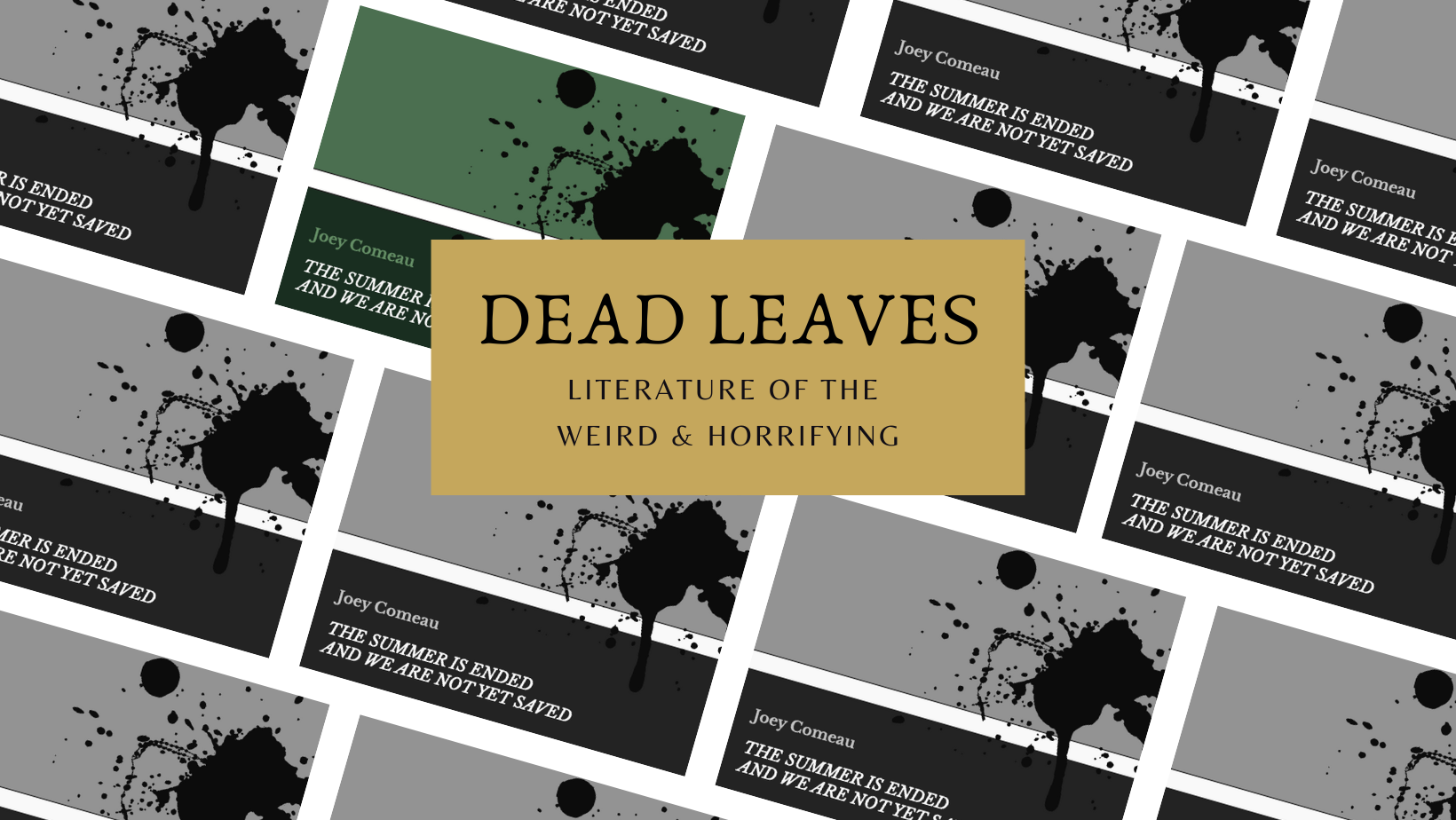Welcome to Dead Leaves, an occasional table stacked high with recent horror tomes! Today we’re headed to summer camp… and our very souls are in jeopardy. Joey Comeau’s The Summer Is Ended and We Are Not Yet Saved is back in print, welcoming a new generation of readers to Christo-slasher Hell. Double-knot your sneaker laces, practice your archery skills, and say a prayer to anyone listening, because we’re in for a hot, bloody vacation.

It’s been 15 years since Joey Comeau sent DIY novella Bible Camp Bloodbath out into the world. The book’s first title is more flippant than its second, The Summer Is Ended and We Are Not Yet Saved (initially re-issued by ChiZine in 2013 and by Comeau himself in 2025). Now available once again in print and e-formats, the book packs a short but powerful punch, melding the best of its blood-and-guts origin with the more probing question presented by the mere concept of “saved.”
Slashers have never really gone out of popularity, but the true throwback flavors have been surging in recent years. The Fear Street anthology films, the X film series, the slasherfied Pretty Little Liars revival, Bryan Fuller’s upcoming Friday the 13th series, the latest I Know What You Did Last Summer arriving July 18: the slasher has perhaps not been so alive since its golden age.
Comeau’s book is well-situated for its own revival, given ongoing interest in the genre from multiple angles. There’s the die-hard horror hounds who never repudiated low-rent, effects-heavy spectacles. There’s a literary wave of queer horror set at evangelical camps, like Gretchen Felker-Martin‘s Cuckoo and Chuck Tingle‘s Camp Damascus. There’s the rising generation of kids discovering their parents’ Dean Koontz and Christopher Pike paperbacks. And there are those parents themselves, people around my age who grew up in the postmodern slasher moment and who honed their taste for irony on the work Comeau is most famous for.
A Softer World, co-authored with Emily Horne, arrived in 2003 and ran for more than a decade. At first blush, The Summer Is Ended stands in stark contrast to ASW. What could a straight-up serial killer thriller have in common with a wry, understated comic strip? Yet both works are miracles of brevity, and at times masterpieces of darkness. The Summer Is Ended has a simple enough set-up: there’s a boy named Martin who loves his mother very much. His mom is a cool mom, one who designs special effects for movies with names like Blood Socket 2. She’s so cool she has a shot at working on a Toronto film set–and Martin loves her so much he’s willing to go to Bible camp, of all places, so that she doesn’t have to take care of him for a few months. Once there, things unravel rapidly as campers and counselors begin to go missing, and all signs point to the camp’s lone authority figure.
Martin’s mother Elizabeth has never been much of an authority figure. Their relationship is the book’s true core; her parents don’t understand her, Martin’s father isn’t in the picture, and the two of them have been a duo for so long they have a shared language that would freak out the normies. Once Martin’s at camp, the book adds in an email element, Elizabeth sending messages from Toronto–messages only legible to her son. It’s a clever device.
At first, Elizabeth’s outrageous descriptions of the CN Tower turning blood-red, a TV channel of a girl’s nightmares, and mutant squirrels are just embellishments to make him laugh. They’re souvenirs from home, a friendly nightlight in the strange dark of camp. They might not seem comforting to any of the other kids, but Martin understands his mother… and believes that she understands him. It’s within this understanding, this shared language, that the story’s ultimate tragedy resides.

But first, a little Father Tony. Oh, Father Tony! Who of the reformed Jesus freaks among us hasn’t known a Father Tony? I grew up Mormon and we have our own church camps, but I also attended a lot of Baptist vacation Bible school in my formative years, and Father Tony is definitely more their stripe. The summer camp’s spiritual and logistical leader, his youth pastor persona is the perfect mask for a stone-cold killer. He neither spares the axe nor spoils the child.
There’s never any question as to who’s doing the camp killings, which is crucial to the book’s power. It’s not a mystery, it’s an inevitability. The absolute straightness with which Comeau plays makes the plot a gateway. It’s not that The Summer Is Ended “rises above” its slasher origins. Instead, its open revelry on Father Tony’s part and its genre-savviness on Martin’s side permit the reader to think about why we tell stories around the campfire. Why Elizabeth sends her pre-teen child graphic descriptions of prop eyeballs. Why Tony’s answer to a counselor discovering his bloodthirstiness is to just kill that counselor, too.
For Tony, the question isn’t “how do I get away with it?” but “do I want to do it again?”
At one point, just after sharing a first kiss with a girl camper named Joan, Martin realizes he’s never had a secret before. This experience comes fast on the heels of an unusually vulnerable email from his mother, one in which she muses on the heterodox manner of his raising. But look how you turned out, she writes, confident in Martin’s self-esteem, not knowing bodies are hitting the forest floor all around her son. Her bleak imaginings for his summer are that he might bullied by the Christians, or at worst, that he might find religion himself.
Despite her reality being tied up in fake blood, rubber guts, and silicone eyeballs, her imagination can’t stretch far enough to encompass Martin’s new reality. They have a code word, it seems: velociraptor. A word for when all else fails, a childish cry into the dark that’s ultimately code for believe me. Martin types it more than once in his increasingly frantic emails, sure that Elizabeth will remember its import. As the word is written over and over, though, it becomes less comprehensible, not more. As Martin grows up, neither he nor his mother have noticed their natural divergence, a gulf widening between them. With each of Father Tony’s killings, humanity itself becomes less comprehensible, young bodies made into meat, reduced to blood and hair. With Elizabeth’s final email, the final nail is hammered too–his image in her imagination forever, made safe only by Death’s certitude.
To be saved is to know your soul is Heaven-bound. But there’s no Heaven in sight at the conclusion of Summer.
Thanks to Joey Comeau for an advance copy of The Summer Is Ended and We Are Not Yet Saved! The book is available from his website in your format of choice. Find him on Patreon for new fiction, and revisit A Softer World at its archive. Happy reading, ghouls!

